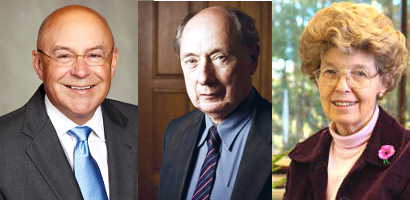Three scientists who discovered and developed the technique of using specific genes to control the behaviour of plants have been recognised for their contributions which is acknowledged as a powerful tool towards ending hunger and poverty in the world.
The three scientists Dr. Van Marc Montegue from Belgium and two American researchers Dr. Mary Dell Chilton and Robert Freley received the World Food Prize at a sparkling awards ceremony held at the seat of the capital of the US State of Iowa in Des Moines last Thursday.
The World Food Prize, started by Nobel Peace Laureate the late Dr. Norman Borlague in 1987, is considered by many as world’s highest honour in the field of Agriculture and is awarded every year to individuals with outstanding contributions towards ending hunger in different parts of the world.
The President of the World Food Prize Foundation Ambassador Dr. Kenneth Quinn hailed the three scientists for their pioneering efforts that have led to the development of a number of genetically enhanced crops that are now grown on 170 million hectares by over 17 million farmers worldwide.
The award winners received glowing tributes for their work which many say has helped to reduce hunger in many parts of the world. Because of its ability to enhance crop yields as well as resistance to pests and climate stresses, GMO crops have been cited as one of the best tools to end hunger and poverty in the world, especially Africa where the challenge of poor yields, climate stress and crop pests and diseases pose the greatest challenges.
In response, the laureates, while acknowledging the opposition towards their efforts, noted that the technology offers immense potential in the fight against hunger and poverty.
Mary Dell Chilton, one of the founders of the global multi-national Syngenta, said:
“My hope is this will put to rest the misguided opposition” to the crops. Chilton referred to genetically modified organisms as a “wonderful tool” in the fight against hunger.
The awards were part of a week-long series of events that included the Norman Borlague, also held in Des Moines, to discuss the relevance of biotechnology in an increasingly changing climate to ensure food security and environmental sustainability.
The events were however not without the cloud of controversy that has surrounded the GMO technology for several years now.
Several groups such as the Union of Concerned Scientists staged protests around the awards venue blaming Fraley’s Monsanto as having failed to improve agriculture.
The groups which included Centre for Food Safety, Iowa Citizens for Community Improvement and other Action Aid, said they delivered a petition to the World Food Prize signed by more than 345,000 people opposed to GMOs.
Uganda’s parliament is yet to debate a controversial bill whose aim is to regulate the introduction and development of crop traits that result into higher yields or better resistance to pests and diseases.








